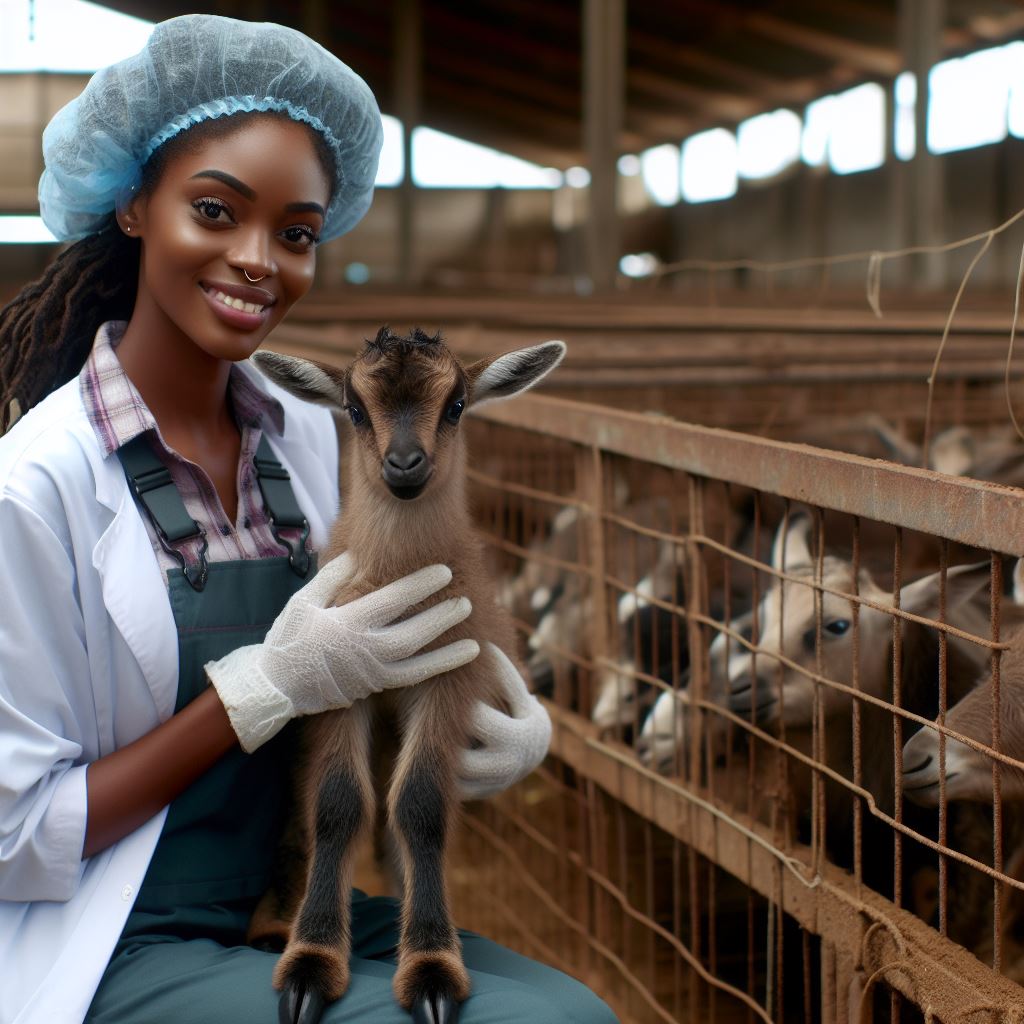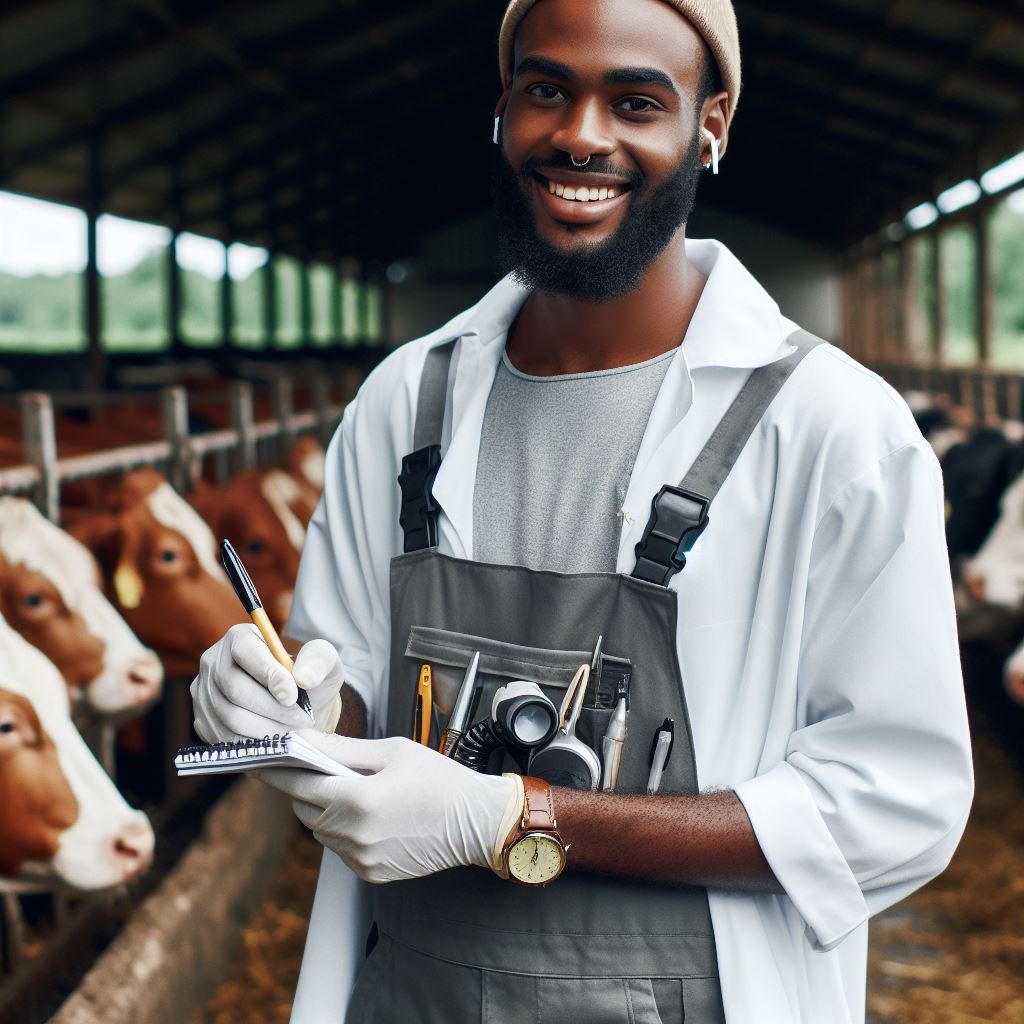Introduction
Animal nutrition courses play a crucial role in Nigeria, ensuring optimal health and productivity of livestock.
Importance of animal nutrition courses in Nigeria
Proper animal nutrition is vital for maximizing productivity, improving animal health, and ensuring food security.
Relevance of modern techniques and trends in these courses
Modern techniques and trends in animal nutrition courses help farmers enhance feed efficiency, minimize production costs, and promote sustainable agriculture.
Incorporating advanced technologies like precision feeding and ration balancing optimizes nutrient utilization and reduces waste.
Understanding the nutritional needs of different animal species and incorporating innovative feed additives improves performance.
Adopting novel techniques such as hydroponic green fodder production ensures year-round availability of high-quality forage.
Improved knowledge of animal nutrition aids in preventing diseases and reducing the need for antibiotics in livestock production.
Keeping abreast with modern trends helps professionals develop innovative and eco-friendly practices in animal nutrition.
By blending traditional knowledge with modern techniques, animal nutrition courses contribute to the overall growth of Nigeria’s livestock industry.
Overview of Animal Nutrition Courses in Nigeria
In Nigeria, animal nutrition courses are an essential part of agricultural education.
These courses aim to provide students with the necessary knowledge and skills to optimize animal feed and nutrition.
Current State of Animal Nutrition Education in Nigeria
The current state of animal nutrition education in Nigeria is encouraging. Many universities and agricultural institutions offer specialized courses in this field.
These courses are designed to equip students with a comprehensive understanding of animal physiology, digestion, and metabolism.
Students also learn about the different types of animal feed and how to formulate balanced diets for various species.
Practical training in feed analysis, feed processing techniques, and quality control is also included in these courses.
Key Aspects Covered in Animal Nutrition Courses
Animal nutrition courses cover a wide range of key aspects that are crucial for ensuring the health and optimal growth of livestock and poultry.
- Anatomy and physiology of the digestive system: Students learn about the structures and functions of the digestive system in different animals.
- Nutrient requirements: Understanding the specific nutrient requirements of various species is vital for formulating balanced diets.
- Feed formulation: Students acquire knowledge on how to calculate and balance the composition of animal feed to meet specific nutritional needs.
- Feed processing: The courses emphasize various feed processing techniques to enhance the digestibility and bioavailability of nutrients.
- Feed quality control: Quality control measures are taught to ensure the safety and nutritional adequacy of animal feed.
- Animal welfare and ethical considerations: The courses also emphasize the importance of considering animal welfare and ethical aspects when formulating diets.
The Importance of Staying Updated with Modern Techniques and Trends
Keeping up with modern techniques and trends in animal nutrition is crucial for professionals in the field.
- New research findings: The animal nutrition field is constantly evolving, and staying updated with the latest research is essential for making informed decisions.
- Advancements in feed technology: Modern techniques and technologies in feed production can greatly enhance animal performance and production efficiency.
- Optimizing feed conversion: Implementing modern techniques can help optimize feed conversion ratios, reducing feed costs and minimizing environmental impact.
- Meeting consumer demands: As consumer preferences and demands change, staying updated with modern techniques allows producers to meet these requirements.
- Improved animal health and productivity: By staying updated with modern techniques, animal nutrition professionals can improve animal health and maximize productivity.
In essence, animal nutrition courses in Nigeria provide students with a comprehensive understanding of the key aspects of animal feed and nutrition.
Staying updated with modern techniques and trends is crucial for achieving optimal animal health and productivity in today’s dynamic agricultural industry.
Read: Field Trips & Practical Experiences in Nigerian Animal Science
Evolution of Animal Nutrition Courses in Nigeria
Animal nutrition courses in Nigeria have undergone significant changes over the years.
Here, we will explore the historical development of animal nutrition education in the country and how traditional methods have evolved to incorporate modern techniques.
Historical Development of Animal Nutrition Education
In the early days, animal nutrition education in Nigeria was quite limited, primarily consisting of traditional knowledge passed down through generations.
This knowledge revolved around traditional feeding practices and lacked scientific backing.
However, with the advancement of agriculture and the recognition of the importance of animal nutrition, animal nutrition courses started to emerge in formal education institutions.
These courses aimed to provide a scientific understanding of animal dietary requirements and feeding practices.
Evolution from Traditional to Modern Techniques
Over time, animal nutrition courses have evolved to incorporate modern techniques and scientific principles.
Instead of relying solely on traditional knowledge, students now learn about the biochemical aspects of animal digestion, nutrient absorption, and metabolism.
Modern techniques such as ration formulation, feed analysis, and feeding trials have become integral parts of animal nutrition education in Nigeria.
These techniques allow students to make informed decisions regarding animal diets and maximize animal productivity.
Factors Driving the Evolution
Several factors have contributed to the evolution of animal nutrition courses in Nigeria.
Firstly, increased awareness about the link between animal nutrition and overall animal health and performance has emphasized the importance of formal education in this field.
Furthermore, the growing demand for livestock products and the need for sustainable agricultural practices have driven the need for well-trained animal nutritionists.
These professionals play a vital role in ensuring optimal animal health and efficient production.
The availability and accessibility of modern technologies have also played a significant role in the evolution of animal nutrition courses.
With advancements in laboratory techniques and research methods, students can explore nutrition-related topics in-depth and apply their knowledge effectively.
In fact, animal nutrition courses in Nigeria have come a long way from relying solely on traditional knowledge to incorporating modern techniques.
The historical development of animal nutrition education, the evolution from traditional to modern techniques, and the factors driving this evolution have all contributed to a more comprehensive understanding of animal nutrition in the country.
As Nigeria continues to develop its livestock industry, the importance of well-trained animal nutritionists and the continuous advancement of animal nutrition courses cannot be overstated.
Read: Career Prospects: Graduating in Animal Nutrition from Nigeria
Transform Your Career with Expert Guidance
Get personalized mentorship consulting that’s tailored to your unique path. Our expert advice is actionable and exclusive.
Get StartedModern techniques in Nigerian animal nutrition courses
In recent years, Nigerian animal nutrition courses have embraced modern techniques to enhance the field.
These advancements have revolutionized the way animal nutrition research and practice are conducted in the country.
Use of Advanced Technology in Animal Nutrition Research and Practice
The integration of advanced technology in animal nutrition research and practice has immensely contributed to the development of the field in Nigeria.
Through the use of sophisticated equipment and tools, researchers have gained a deeper understanding of animal physiology and metabolism.
Advanced technology, such as Next Generation Sequencing (NGS), has enabled scientists to analyze the genetic makeup of animals and identify specific genes responsible for various traits related to nutrition.
This information has been instrumental in developing tailored feeding programs.
Additionally, precision feeding techniques have gained significant popularity in Nigerian animal nutrition courses.
This approach involves providing animals with individualized and optimized diets to meet their specific nutritional requirements.
Application of Precision Feeding Techniques to Optimize Animal Nutrition
Precision feeding techniques consider factors such as age, weight, breed, and physiological status to formulate personalized diets for animals.
By utilizing precision farming methods, farmers can achieve optimal growth, production, and health of their livestock.
For instance, feeding dairy cows with a precision approach ensures that lactating cows receive the correct balance of energy, protein, minerals, and vitamins.
This precision helps maximize milk production while minimizing nutrient waste.
In pig farming, precision feeding has been shown to reduce the occurrence of metabolic disorders and improve overall production efficiency.
By precisely measuring feed intake and combining it with real-time data analysis, farmers can monitor and adjust diets accordingly.
Use of Computer-Based Modeling and Simulation in Designing Feed Formulations
Computer-based modeling and simulation have become integral tools in designing feed formulations for Nigerian animal nutrition courses.
These models utilize mathematical algorithms to predict the nutrient requirements of animals.
By inputting data such as animal species, age, weight, growth rate, and desired performance outcomes, nutritionists can generate optimized feed formulas.
These formulas provide a detailed breakdown of the required proportions of different feed ingredients.
The use of computer-based modeling not only ensures precise nutrient delivery but also assists in cost optimization.
By simulating different scenarios and adjusting ingredient ratios, nutritionists can design cost-effective diets without compromising animal health and performance.
All in all, modern techniques have significantly transformed Nigerian animal nutrition courses.
The adoption of advanced technology, precision feeding techniques, and computer-based modeling has improved research capabilities, optimized animal nutrition, and enhanced feed formulation processes.
These advancements not only benefit farmers and animal nutritionists but also contribute to the overall growth and sustainability of the livestock industry in Nigeria.
Read: Postgraduate Opportunities in Animal Science in Nigeria

Current trends in Nigerian animal nutrition courses
In recent years, Nigerian animal nutrition courses have witnessed several shifts and advancements.
These changes are in response to emerging concerns related to sustainability, nutrition research, and changing dietary preferences.
The following factors highlight the current trends in Nigerian animal nutrition courses:
Sustainable and eco-friendly feed production strategies
- One of the major trends in Nigerian animal nutrition courses is the focus on sustainable and eco-friendly feed production strategies.
- Efforts are being made to reduce the environmental impact of animal feed production by adopting practices that minimize resource utilization.
- Course curricula now include modules on precision feeding, which aims to optimize animal diets while reducing waste and improving nutrient utilization.
- Students are encouraged to explore innovative feed ingredients, such as insect protein, and create feed formulations that are environmentally friendly and economically viable.
- Sustainable feed production strategies are being promoted to support the growth of the Nigerian livestock industry while safeguarding the natural resources.
Integration of nutritional Genomics and metabolomics in Animal Nutrition Research
- Nigerian animal nutrition courses are witnessing a growing integration of nutritional genomics and metabolomics in research.
- Students are exposed to cutting-edge techniques that allow the identification of specific genes associated with improved feed efficiency and animal health.
- Nutritional genomics aids in understanding the interaction between diet and genes, leading to personalized animal nutrition recommendations.
- Metabolomics helps in analyzing metabolic processes and identifying biomarkers for assessing nutrient utilization and overall health status in animals.
- This integration of advanced technologies enhances the understanding of animal nutrition and contributes to the development of customized feeding strategies.
Increasing focus on alternative protein sources and plant-based diets
- Another striking trend in Nigerian animal nutrition courses is the increasing focus on alternative protein sources and plant-based diets.
- The demand for animal protein is rising, but concerns about sustainability and ethical considerations have led to a shift towards plant-based protein sources.
- Courses now emphasize the evaluation of alternative protein sources, such as soybean, pea, and even microbial-derived proteins.
- Students are encouraged to explore the nutritional profiles of these sources and assess their suitability for different animal species.
- The objective is to find viable alternatives to traditional protein sources that can meet the nutritional requirements of animals while reducing the environmental footprint.
In short, Nigerian animal nutrition courses are constantly evolving to keep up with the changing dynamics of sustainable feed production, advancements in nutrigenomics, and the increasing popularity of plant-based diets.
These trends reflect the industry’s commitment to ensuring the efficient and responsible use of resources while meeting the nutritional needs of animals.
Read: Top Universities in Nigeria Offering Animal Nutrition Courses
Find Out More: Wildlife Conservation vs. Wildlife Management in Nigeria
Uncover the Details: Impact of Plant Breeding on Nigerian Agriculture
Challenges in Incorporating Modern Techniques and Trends in Nigerian Animal Nutrition Courses
When it comes to incorporating modern techniques and trends in Nigerian animal nutrition courses, there are several challenges that hinder their successful adoption.
These challenges not only affect the quality of education but also limit the overall progress of animal nutrition in the country.
1. Barriers Hindering the Adoption of Modern Techniques
- Lack of awareness among educators and practitioners regarding the advantages of modern techniques.
- Inadequate training and exposure to modern techniques for both students and instructors.
- Resistance to change and the preference for traditional methods that are deeply rooted in Nigerian culture.
- The absence of updated curricula that include modern techniques and trends in animal nutrition.
- Insufficient research and development in the field of animal nutrition, limiting innovation and progress.
2. Limited Availability of Resources and Infrastructure
- Scarce funding for educational institutions, limiting their ability to acquire modern technology and equipment.
- Inadequate laboratory facilities and testing capabilities to implement practical aspects of modern techniques.
- Lack of access to cutting-edge research publications and journals due to limited subscriptions and high costs.
- Poor internet connectivity and limited digital resources for accessing up-to-date information on modern trends.
- Inadequate support from the government and regulatory bodies to improve resource availability and infrastructure.
3. The Need for Capacity Building and Collaborations
- Insufficient professional development opportunities for educators to update their knowledge and skills in modern techniques.
- The absence of partnerships between educational institutions and industry professionals to facilitate knowledge transfer.
- Inadequate collaboration between different departments and disciplines to foster an interdisciplinary approach to animal nutrition.
- Limited funding for research projects and initiatives that focus on modern techniques and their application in Nigerian animal nutrition.
- The lack of teamwork and collaboration among students due to the competitive nature of the education system.
Overall, it is evident that the incorporation of modern techniques and trends in Nigerian animal nutrition courses faces several challenges.
Overcoming these barriers requires a concerted effort from educational institutions, government bodies, and industry professionals.
It is crucial to raise awareness about the benefits of modern techniques, invest in resources and infrastructure, and foster collaborations to address these challenges and ensure the advancement of animal nutrition education in Nigeria.
See Related Content: Top Universities Offering Wildlife Management in Nigeria
Opportunities for further improvement in Nigerian Animal Nutrition Courses
Nigerian animal nutrition courses have come a long way in recent years, incorporating modern techniques and trends to meet the evolving needs of the industry.
However, there are still several areas that offer opportunities for further improvement.
1. Collaborations with international institutions and experts
Establishing partnerships with renowned international institutions can bring valuable expertise and diverse perspectives to Nigerian animal nutrition courses.
Collaborating with experts from different countries can enhance the curriculum, ensuring it remains relevant and up to date.
These collaborations can also facilitate knowledge exchange, exposing students to global best practices and emerging research in the field.
2. Increasing research funding for animal nutrition studies
Increased research funding is crucial for advancing animal nutrition courses in Nigeria.
Investing in research allows for the exploration of new concepts, techniques, and trends.
This funding can support research projects that address specific challenges faced by the Nigerian animal nutrition industry.
Research findings can inform curriculum development, ensuring that courses are based on scientific evidence and industry needs.
3. Continuous professional development and training for educators
Providing opportunities for continuous professional development and training is vital for educators in animal nutrition courses.
Regular training programs can keep educators abreast of new trends, technologies, and teaching methodologies.
This professional development helps educators deliver high-quality and industry-relevant instruction.
By upgrading their skills, educators can effectively transfer knowledge and inspire students to excel in the field.
In general, Nigerian animal nutrition courses have made significant strides in incorporating modern techniques and trends.
However, there are ample opportunities for further improvement.
Collaborations with international institutions and experts can bring valuable insights, while increased research funding can support new discoveries.
Continuous professional development for educators ensures the delivery of high-quality instruction.
By seizing these opportunities, Nigerian animal nutrition courses can continue to evolve and meet the demands of a rapidly changing industry.
Conclusion
Modern techniques and trends in Nigerian animal nutrition courses are of paramount importance.
These advancements play a crucial role in ensuring sustainable growth and development in the field.
It is imperative that these advancements are promoted and embraced by students, educators, and policymakers.
The significance of these modern techniques and trends cannot be overstated.
They contribute to the overall health and well-being of animals, improve productivity and efficiency in livestock production, and enhance the quality of animal products.
These advancements also play a vital role in reducing environmental impact and ensuring the sustainability of the agricultural sector.
To ensure the widespread adoption and success of these advancements, it is essential for stakeholders to support and promote them.
Educators should incorporate these modern techniques and trends into their curriculum to equip students with the necessary knowledge and skills.
Policymakers need to create an enabling environment that encourages investment and research in the field of animal nutrition.
Furthermore, students should actively seek opportunities to learn and engage with these developments.
They should attend workshops, conferences, and training programs to stay updated with the latest techniques and trends.
By embracing and supporting these advancements, students can have a profound impact on the future of animal nutrition in Nigeria.
Modern techniques and trends in Nigerian animal nutrition courses are crucial for the sustainable growth and development of the field.
It is only through the promotion and support of these advancements that we can ensure a better future for animal nutrition in Nigeria.
Together, let us embrace and champion these developments to improve the overall well-being of animals and the agricultural sector as a whole.




